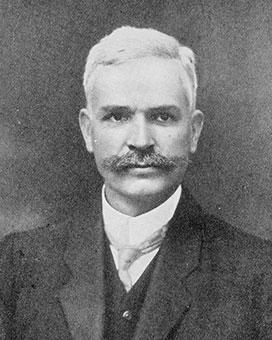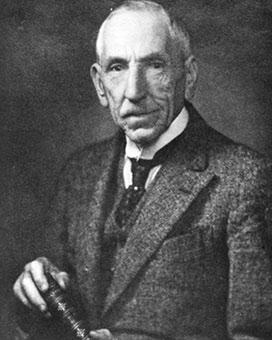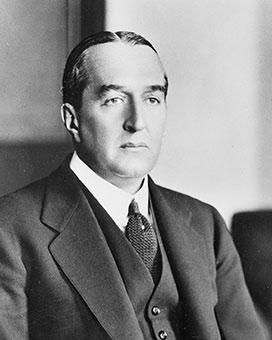Allen, George
First head of the Commonwealth Treasury 1901–16, Allen had been an accountant in the Victorian Treasury.
Asquith, (Lord) Herbert Henry
Britain's Liberal Prime Minister 1908–16, during the Deakin, Fisher, Cook and Hughes governments.
Barton, (Lady) Jane
Jane Barton was prime ministerial wife 1901–03. She was afterwards foundation president of the Queens Club in Sydney; and had been a vice-president of the Sydney Women's Federation League in 1899.
National Archives of Australia Commonwealth Person CP 930.
Barton, (Sir) Edmund
Protectionist Member of the House of Representatives 1901–03 (Hunter). Barton was Prime Minister and Minister for External Affairs 1901–03, and a judge of the High Court 1903–20.
Read more about Edmund Barton.
National Archives of Australia Commonwealth Person CP 710.
Bridges, (Sir) William Throsby
Founding commandant of the Royal Military College, Duntroon (1911–14) and founding commander of the Australian Imperial Force (1914–15), Major-General Bridges died after he was wounded in the first month of the Gallipoli campaign in 1915.
Bruce, (Lord) Stanley Melbourne
Member of the House of Representatives (Flinders) for the Nationalist Party 1918–29 and for the United Australia Party 1931–33. Treasurer (1921–23) during the Hughes government, Prime Minister 1923–29, Minister for External Affairs 1923–29, Minister for Health 1927–28, and Minister for Trade and Customs 1928. Bruce was honorary Minister in London 1932–33 during the Lyons government and High Commissioner in London 1933–45 during the Lyons, Page, Menzies, Fadden and Curtin governments.
Read more about Stanley Bruce.
National Archives of Australia Commonwealth Person CP 23.
Clemenceau, Georges
President of France 1906–09 and 1917–20, presided at the peace conference at Versailles in 1919.
Clemons, John Singleton
Senator for Victoria for the Free Trade Party 1910–10, the Anti-Socialist Party 1910–13, and the Deakin Liberal Party 1913–14. Minister without portfolio (24 June 1913 – 19 September 1914).
Cook, (Dame) Mary
Prime ministerial wife 1913–14, Dame Mary Cook received the Dame Commander of the Most Excellent Order of the British Empire (DBE) for her wartime work for the Australian Red Cross Society.
National Archives of Australia Commonwealth Person CP 937.
Deakin, Alfred
Member of the House of Representatives (Ballarat) for the Protectionist Party 1901–10 and the Liberal Party 1910–13. Deakin was the first Attorney-General, in the Barton government (1901–03), Prime Minister three times (1903–04, 1905–08, 1909–10), and Minister for External Affairs in his own governments in 1903–04 and 1905–08. As a Victorian parliamentarian and leading federationist, Deakin had been a delegate to the 1890 Federation Conference and to both federation Conventions (1891 and 1897–98) and a member of the Constitution Bill deputation in London in 1900.
Read more about Alfred Deakin.
National Archives of Australia Commonwealth Person CP 9.
Deane, Percival (Percy) Edgar
Percy Deane was private secretary to Prime Minister William Hughes in 1916–21, and secretary to the Australian delegation at the Versailles Peace Conference in 1919. One of the most influential Commonwealth government officials in the 1920s, he was permanent head of 3 departments: Prime Minister's Department (1921–29) and Department of External Affairs (1921–28) during the Bruce government, and Department of Home Affairs (1929–32) during the Scullin and Lyons governments.
National Archives of Australia Commonwealth Person CP 78.
Denman, (Lord) Thomas
Governor-General of Australia 31 July 1911 – 18 May 1914, during the Fisher and Cook governments.
Farrer, William
Employed by the New South Wales Department of Agriculture from 1898, Farrer produced rust-free wheat strains including 'Federation' wheat, the leading variety in Australia from 1910 to 1925, at his experimental station at Lambrigg near the site later chosen for the federal capital. He had been a surveyor in the New South Wales Department of Lands 1875–86.
Fisher, Andrew
Labor Party Member of the House of Representatives 1901–15 (Wide Bay), Andrew Fisher was Minister for Trade and Customs in the Watson government in 1904, Prime Minister 3 times (1908–09, 1910–13, 1914–15), and Treasurer in each of his own 3 governments. Fisher was High Commissioner in London 1916–21.
Read more about Andrew Fisher.
National Archives of Australia Commonwealth Person CP 713.
Fisher, Margaret
Prime ministerial wife in 1908–09, 1910–13, and 1914–15.
National Archives of Australia Commonwealth Person CP 944.
Forrest, (Sir) John
Member of the House of Representatives (Swan) for the Protectionist Party 1901–06, West Australia Party 1906–10, Deakin Liberal Party 1910–17, and the Nationalist Party 1917–18. Postmaster-General (1–10 January 1901) and Minister for Defence (10 January 1901 – 24 September 1903) in the Barton government, Minister for Home Affairs in the Deakin government (24 September 1903 – 27 April 1904), Treasurer (5 July 1905 – 30 July 1907) in the second Deakin government, Treasurer in the third Deakin government (2 June 1909 – 29 April 1910), and Treasurer (24 June 1913 – 17 September 1914) in the Cook government, Treasurer (17 February 1917–27 March 1918) in the Hughes government. Forrest had been Premier of Western Australia 1890–1901.
Garran, (Sir) Robert Randolph
Appointed first head of the Attorney-General’s department and parliamentary draftsman on 1 January 1901, Garran remained in this post until 5 February 1932. He served the governments of 10 prime ministers, Barton, Deakin, Watson, Reid, Fisher, Cook, Hughes, Bruce, Scullin and Lyons. As a young Sydney federationist in Barton’s circle, Garran had been secretary to the 1897–98 Constitutional drafting committee.
National Archives of Australia Commonwealth Person CP 396.
George V, King
Grandson of Queen Victoria, son of King Edward VII, as Duke of York opened first Commonwealth parliament in 1901, with Queen Mary British monarch 1910–36.
Glynn, Patrick McMahon
Member of the House of Representatives 1901–03 (South Australia) and 1903–19 (Angas). Glynn was a member of the Free Trade Party 1901–06, the Anti-Socialist Party 1906–10, the Deakin Liberal Party 1910–17 and the Nationalist Party 1917–19. Attorney-General in the third Deakin government (2 June 1909 – 29 April 1910), Minister for External Affairs in the Cook government (24 June 1913 – 17 September 1914), and Minister for Home and Territories in the Hughes government (17 February 1917–3 February 1920). As a South Australian parliamentarian and federationist, Glynn was an influential delegate at the 1897–98 federation convention.
National Archives of Australia Commonwealth Person CP 3.
Griffin, Walter Burley
United States architect who, with Marion Mahoney Griffin, provided the original design for Australia’s national capital in 1913, but was removed as architectural director in 1920.
Groom, (Sir) Littleton Ernest
Member of the House of Representatives (Darling Downs) 1901–29 and 1931–36, Groom was Minister for Home Affairs and then Attorney-General (12 October 1906 – 13 November 1908) replacing Isaac Isaacs in the second Deakin government, Minister for External Affairs in the third Deakin government (2 June 1909 – 29 April 1910), and Minister for Trade and Customs in the Cook government (24 June 1913 – 17 September 1914). In the Hughes government he served as honorary Minister (17 February 1917 – 16 November 1917), Vice-President of the Executive Council (16 November 1917–27 March 1918), Minister for Works and Railways (27 March 1918 – 21 December 1921), and Attorney-General (21 December 1921 – 9 February 1923). In the Bruce–Page government he was Attorney-General (9 February 1923 – 18 December 1925), Minister for Trade and Customs and Minister for Health (29 May – 13 June 1924). From 1926 to 1929, he was Speaker of the House of Representatives.
Holman, William Arthur
United Australia Party member of House of Representatives 1931–34 (Martin). A backbencher in the Lyons government, Holman was a former Premier of New South Wales (1913–20) and state parliamentarian 1898–1917 (Labor) and 1917–1920 (Nationalist). In 1911, Holman had been a powerful opponent of the Fisher government’s referendum seeking greater Commonwealth powers over industry, trade and commerce. With Chris Watson, Joseph Cook and William Hughes, he had been a founding member of the New South Wales Labor Electoral League in 1891.
Hughes, (Dame) Mary
Prime ministerial wife 1915–23.
National Archives of Australia Commonwealth Person CP 943.
Hughes, William Morris
Member of the House of Representatives 1901–17 (West Sydney), 1917–22 (Bendigo), 1922–49 (North Sydney) and 1949–52 (Bradfield). Hughes was a member of the Labor Party 1901–17, the Nationalist Party 1917–29, an ‘Independent Nationalist’ 1929–31, United Australia Party 1931–44, Liberal Party 1944–52. Prime Minister (1915–23), Hughes still holds the record as Australia’s longest serving parliamentarian. He was a Minister in the governments of Watson (1904), Fisher (1908–09, 1910–13 and 1914–15), Lyons (1932–39), Page (Attorney-General, Minister for Industry and Minister for External Affairs (7 April 1939 – 26 April 1939), Menzies (Attorney-General 26 April 1939 – 29 August 1941, Minister for Industry 26 April 1939 – 28 October 1940, Minister for the Navy 28 October 1940 – 29 August 1941), and Fadden (continuing as Attorney-General and Minister for the Navy 29 August 1941 – 7 October 1941). During the term of his own government he also served as Attorney-General (27 October 1915 – 21 December 1921), Minister for Trade and Customs (29 September 1916 – 14 November 1916), Minister for External Affairs (21 December 1921 – 9 February 1923). As a New South Wales parliamentarian 1894–1901 Hughes was a founding member of the Labor Party in New South Wales. He became a founding member of the Nationalist Party in 1917, the United Australia Party in 1931, and the Liberal Party in 1945.
Read more about William Morris Hughes.
National Archives of Australia Commonwealth Person CP 290.
Hunt, Arthur Atlee
Founding head of 2 Commonwealth departments, External Affairs (1901–1916) and Home and Territories (1916–1921). Hunt was the first Public Service arbitrator, serving from 1921 until he retired in 1930. He had been a member of Edmund Barton’s circle of federationists in Sydney in the 1890s.
National Archives of Australia Commonwealth Person CP 716.
Irvine, William Hill
Member of the House of Representatives 1906–18 (Flinders), for the Anti-Socialist (1906–10), Deakin Liberal (1910–17) and Nationalist Party (1917–18). Attorney-General in Cook government (24 June 1913 – 17 September 1914).
Kelly, William Henry
Member of the House of Representatives 1903–19 (Wentworth), for the Free Trade (1903–06), Anti-Socialist 1906–10, Deakin Liberal (1910–17) and Nationalist (1917–19) parties. Minister without portfolio in Cook government (24 June 1913 – 17 September 1914).
Latham, (Sir) John Greig
Nationalist/United Australia Party Member of the House of Representatives 1922–34 (Kooyong), Latham was Attorney-General (18 December 1925 – 22 October 1929) in the Bruce–Page government, and from 6 January 1932 to 12 October 1934 in the Lyons government. He was Leader of the Nationalist Party Opposition 1929–31 during the Scullin government. From 1935 until 1952, Latham was Chief Justice of the High Court, with an interval in 1940–41 when he was Australian Minister to Japan. Latham had been a member of the Australian delegation to the Versailles peace conference in 1919.
National Archives of Australia Commonwealth Person CP 148.
Lloyd-George, David
Liberal member of Britain’s House of Commons 1890–1945 and Prime Minister 1916–22, when William Hughes was Prime Minister of Australia, and during the terms of George Reid and Andrew Fisher as High Commissioner in London.
McColl, James Hiers
Protectionist Member of the House of Representatives 1901–06 (Echuca) and Senator for Victoria 1907–14 as a member of the Anti-Socialist and then Deakin Liberal parties. Vice-President of Executive Council 24 June 1913 – 17 September 1914.
Millen, Edward Davis
Senator for New South Wales 1901–23, Millen was a member of the Free Trade Party 1901–06, the Anti-Socialist Party 1906–13, the Deakin Liberal Party 1913–17, and the Nationalist Party 1917–23. He was Vice-President of the Executive Council in the third Deakin government (2 June 1909 – 29 April 1910), Minister for Defence in the Cook government (24 June 1913 – 17 September 1914), Vice-President of the Executive Council (17 February – 16 November 1917), and Minister for Repatriation (28 September 1917 – 9 February 1923) in the Hughes government.
Miller, David
First head of the Department of Home Affairs in November 1901, and administrator of the Federal Capital Territory (ACT) from 1912 until his retirement in 1917. Colonel Miller had been commander of the New South Wales Corps 1900–01 in the Second South African (Boer) War.
National Archives of Australia Commonwealth Person CP 278.
Miller, Emma
An organiser for the Australian Workers Union in western Queensland in the 1890s and the first woman member of the Brisbane Workers Political Organisation, Miller championed equal pay and equal opportunity for women and was foundation president of the Women’s Equal Franchise Association (1894–1905). In 1908, she was a delegate to the federal Labor Party conference, and in 1916 a delegate to the Australian Peace Alliance conference. In her late 70s, Miller campaigned against the conscription referendums in 1916–17.
Munro Ferguson, (Sir) Ronald Craufurd (Viscount Novar)
Governor-General of Australia 18 May 1914 – 6 October 1920.
Pearce, (Sir) George Foster
Senator for Western Australia 1901–38, Pearce was a member of the Labor Party 1901–17, the Nationalist Party 1917–31, and the United Australia Party 1931– 38. He was Minister of Defence in the 3 governments of Andrew Fisher (13 November 1908 – 2 June 1909; 29 April 1910 – 24 June 1913 and 17 September 1914 – 27 October 1915). In the Hughes government, he was Minister for Defence (27 October 1915 – 21 December 1921) and Minister for Home and Territories (21 December 1921 – 9 February 1923). With Hughes, Pearce left the Labor Party over the conscription issue in 1917 and formed the Nationalist Party. In the Bruce–Page government Pearce was Minister for Home and Territories (9 February 1923 – 18 June 1926), and Vice-President of the Executive Council (18 June 1926 – 22 October 1929). From 1929 to 1931, Pearce led Opposition members in the Senate, he was then Minister for Defence (6 January 1932 – 12 October 1934), Minister for External Affairs and Minister for Territories (12 October 1934 – 29 November 1937), in the Lyons government. In 1939 Pearce was a member of the Commonwealth Grants Commission.
National Archives of Australia Commonwealth Person CP 151.
Pratten, Herbert Edward
Nationalist Senator for New South Wales 1917–21, Nationalist Member of the House of Representatives 1921–22 (Parramatta) and 1922–28 (Martin), Minister for Trade and Customs (13 June 1924 – 7 May 1928) and Minister for Health (13 June 1924 – 16 January 1925) in the Bruce–Page government. Pratten had been a Sydney businessman, from 1889 a soft drinks manufacturer, a printer and a pioneer jam maker. He developed interest in gold mining, and in tin mining in Malaya. He gave up his businesses when he became a member of parliament in 1917.
Reid, Sir George Houstoun
Free Trade/Anti-Socialist Party Member of the House of Representatives 1901–10 (East Sydney) and Prime Minister and Minister for External Affairs 1904–05, Reid was also Leader of the Opposition 1901–04 and 1905–08. From 1910 to 1916, he was Australian High Commissioner in London, and from 1916 until his death in 1918 a member of the British House of Commons. Reid had also served in the New South Wales parliament 1880–84 and 1885–1901, and was Premier in 1894–99.
Read more about George Reid.
National Archives of Australia Commonwealth Person CP 712.
Roosevelt, Theodore
Republican Party President of the United States of America 1901–09.
Ryrie, (Sir) Granville de Laune
Liberal/Nationalist Party Member of the House of Representatives 1911–22 (North Sydney) and 1922–27 (Warringah). Assistant Minister for Defence and honorary Minister (4 February 1920 – 21 December 1921) in the Hughes government, High Commissioner in London 1927–32, member of Australian delegation to League of Nations 1927, 1928 and 1929. Ryrie had been a New South Wales parliamentarian 1906–10.
Scott, Rose
Political reformer and founding member of the Womanhood Suffrage League of New South Wales in 1891, the National Council of Women (NSW) in 1896, and the Women’s Political Educational League in 1902. Scott was a prominent anti-conscriptionist.
Shepherd, Malcolm Lindsay
First head of the Department of the Prime Minister 1911–21; official secretary to the High Commissioner in London 1921–27; and head of the Department of Defence 1927–37. Shepherd had been recruited to the new Commonwealth Postmaster-General’s Department in 1901 from the New South Wales department he had joined as a typist in 1890. In 1904 he became private secretary to Alfred Deakin, then to prime ministers Chris Watson, George Reid, and Andrew Fisher. He became a friend of William Hughes, and, while at the High Commission, was Australian representative on the Pacific Cable Board and the Imperial War Graves Commission.
National Archives of Australia Commonwealth Person CP 25.
Watson, John Christian (Chris)
Labor Party Member of the House of Representatives 1901–06 (Bland) and 1906–10 (South Sydney), Watson was first Labor Prime Minister, and Treasurer, for four months in 1904.
Read more about Chris Watson.
National Archives of Australia Commonwealth Person CP 711.
Watt, William Alexander
Liberal/Nationalist Party Member of the House of Representatives 1914–29 (Balaclava). Minister for Works and Railways (17 February 1917 – 27 March 1918), Treasurer (27 March 1918 – 15 June 1920), Minister for Trade and Customs (13 December 1918 – 17 January 1919) in the Hughes government. Watt was acting Prime Minister in 1918–19 while Hughes was in London. He had been a Victorian parliamentarian and was Premier of Victoria 1912–13.
Wilson, Woodrow
Democratic Party President of the United States of America 1912–21.
Wynne, Agar
Protectionist/Deakin Liberal Party Member of the House of Representatives 1906–14 (Balaclava). Postmaster-General in Cook government (24 June 1913 – September 1914).





